Creating an SCCM 2012 Software Catalog Item
App Portal 2013 R2
You can use the New Catalog Item Wizard to create a new SCCM 2012 Software catalog item containing either an application or a package.
Important: While the instructions in this section assume you are adding a single package or application from SCCM 2012 to a new Software catalog item, you can include software from multiple deployment technologies to the same Software catalog item by selecting more than one source on the Software Source panel of the New Catalog Item Wizard. See Creating an SCCM 2007 Software Catalog Item and Creating an Altiris Software Catalog Item.
To create a new Software catalog item from SCCM 2012:
|
2.
|
Under Catalog Management, select New Catalog Item Wizard. The Catalog Item Type panel of the New Catalog Item Wizard opens. |
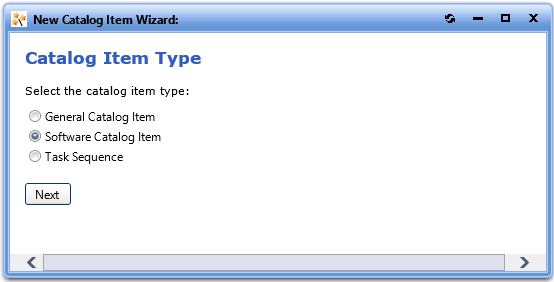
|
3.
|
Select Software Catalog Item and click Next. The Software Source panel opens. |
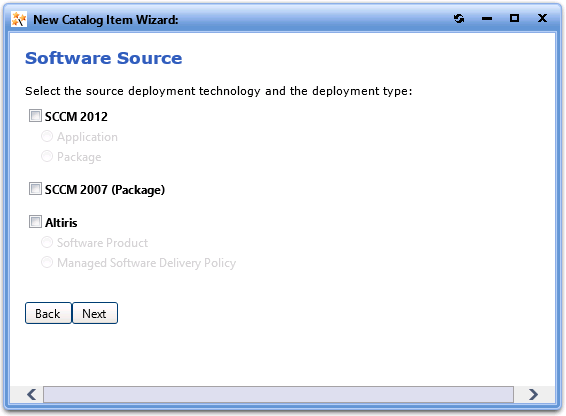
|
4.
|
Select SCCM 2012 and then select the Application or Package option. |
|
5.
|
Click Next. The SCCM 2012 Applications or SCCM 2012 Packages panel opens. |
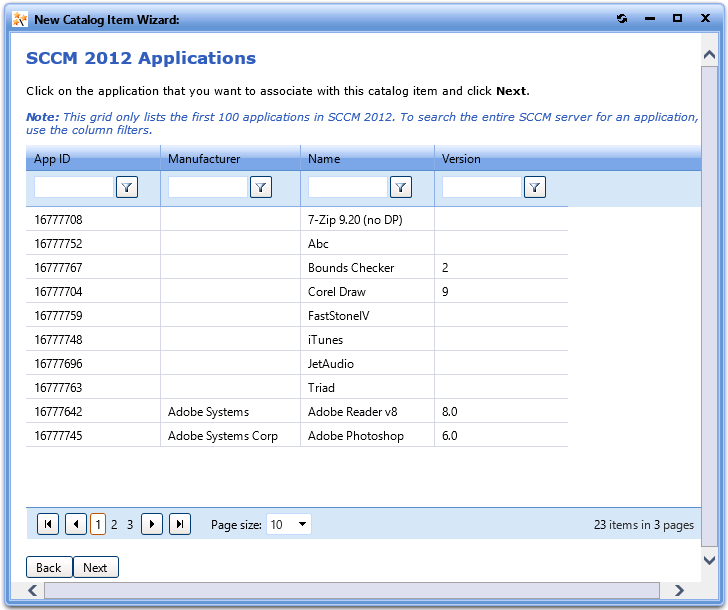
|
6.
|
Locate and select the application or package on the SCCM 2012 server that you want to associate with this new catalog item. |
Important: Only a specified number of applications or packages are initially listed in this grid. To search the entire SCCM server for an application or package, use the column filters.
|
7.
|
Click Next. The Catalog Item Title and Category panel opens. |
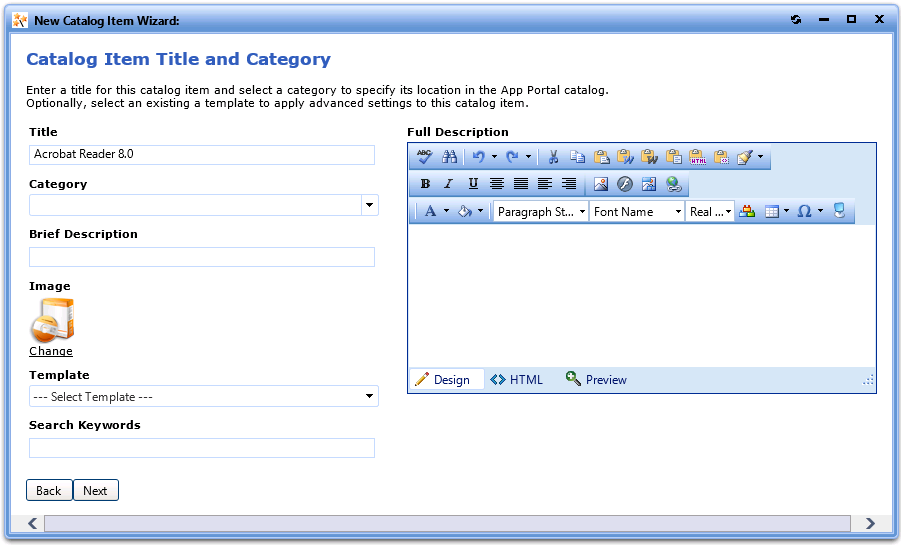
|
8.
|
In the Title field, enter a title to identify this catalog item in your App Portal storefront. By default, the name of the package or application that you selected is listed in this field. |
|
9.
|
From the Category field, select a category to specify this catalog item’s location in the App Portal catalog. You are required to select at least one category, but you may select more than one. |
|
10.
|
In the Brief Description field, enter the text that you want to display under the catalog item Title in the App Portal storefront. |
|
11.
|
By default, a generic icon is associated with this catalog item. To associate a custom icon to this catalog item, click Change to open the Image Selection dialog box and select a .gif, .jpg, or .png icon file. |
Tip: For best results, the uploaded image should be approximately 60 px by 60 px.
|
12.
|
Optionally, from the Template list, select an existing template to apply advanced settings to this catalog item. |
Note: For more information, see Creating a Catalog Item Template.
|
13.
|
In the Search Keywords text box, enter single words that an end user might enter when searching for this catalog item. |
|
14.
|
In the Full Description text area, enter a longer description of this catalog item, and use the items on the toolbar to format it. |
The text entered in the Title, Brief Description, and Full Description fields, along with the catalog item icon, will be displayed when viewing this catalog item on the Browse Catalog tab, as shown below:

|
15.
|
When you are finished editing the fields on the Catalog Item Title and Category panel, click Next. If you are connected to FlexNet Manager Platform via the Flexera Service Gateway, the Flexera ID panel opens. |

|
16.
|
To track licenses for this catalog item using its Flexera ID, use the column filters to locate this application or package in FlexNet Manager Platform, select it, and click Next. |
One of the following panels opens, depending upon whether you are adding an application or a package from SCCM:
|
•
|
Application—The SCCM 2012 Deployment Settings panel opens. |
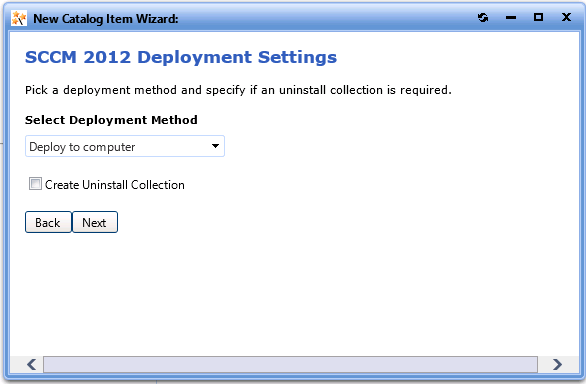
|
•
|
Package—The SCCM 2012 Package Deployment Settings panel opens. |
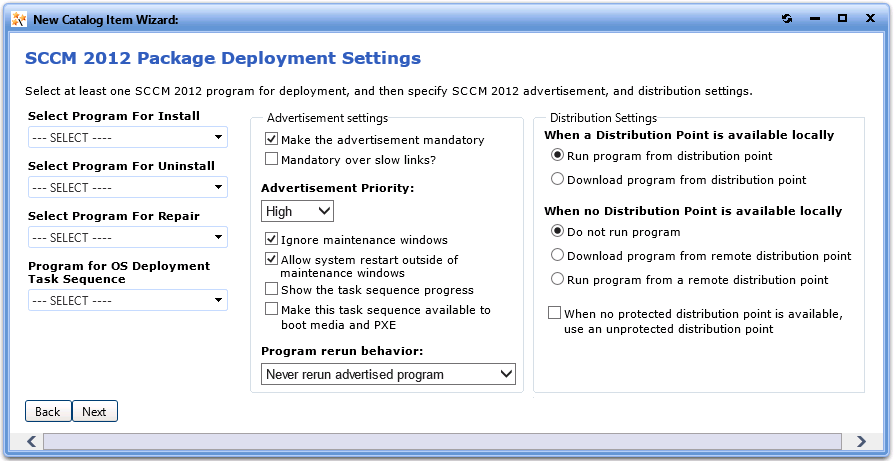
|
17.
|
If you are adding an application from SCCM, perform the following steps on the SCCM 2012 Deployment Settings panel: |
|
a.
|
From the Select Deployment Method list, select one of the following options to specify whether this catalog item will be deployed to a computer or to a user: |
|
b.
|
To add an uninstall collection to this catalog item, select the Create Uninstall Collection option. When this option is selected, users will be able to submit an uninstall request from App Portal, and System Center Configuration Manager will uninstall the application. App Portal will inform the user when the uninstall is complete. |
|
18.
|
If you are adding a package from SCCM, perform the following steps on the SCCM 2012 Package Deployment Settings panel: |
|
a.
|
From the following lists, select at least one existing program from the SCCM server: |
|
•
|
Select Program for Install |
|
•
|
Select Program for Uninstall |
|
•
|
Select Program for Repair |
|
b.
|
Under Program for OS Deployment Task Sequence, select a matching program name for the program function. |
|
c.
|
Under Select Sites to Publish, select the sites where this request will be available, the locations you wish to publish the catalog item to. An advertisement and collection will be created at the site(s) selected. |
|
19.
|
Click Next. The Ready to Create panel opens. |
|
20.
|
If, after this catalog item is created, you want to immediately open this catalog item’s Catalog Item Properties dialog box, where you can specify advanced settings, select the Load advanced view after creating the catalog item option. |
|
21.
|
Review the summary information and then click Create to create this new catalog item. The catalog item will now be listed on the Browse Catalog tab in the category you selected. |
Note: After creating a catalog item, you can edit its basic and advanced settings on the Catalog Item Properties dialog box, as described in Setting Catalog Item Properties.
See Also
New Catalog Item Wizard
Catalog Item Properties Dialog Box
Open topic with navigation








